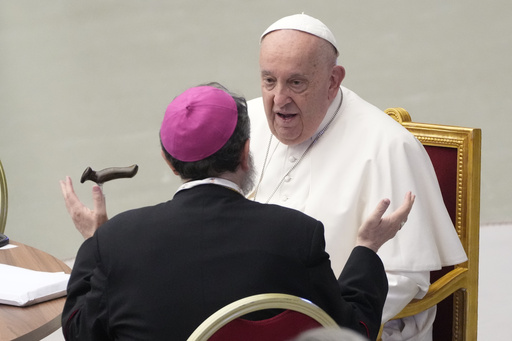VATICAN CITY — The lengthy efforts to reform the Catholic Church wrap up on Saturday, culminating in recommendations that are likely to disappoint many who had hoped for significant changes regarding women’s roles in the institution. Though there are aspirations for a church that better listens to its members, the likelihood of women gaining more equal status remains low.
Cardinal Victor Manuel Fernandez, the Vatican’s leading official on doctrine, communicated to the extraordinary assembly of bishops and laypeople this week that Pope Francis believes the conditions are not yet appropriate for permitting the ordination of women as deacons. This multi-year synod, which aimed to spark change, particularly for women who have long felt marginalized within the church, brought forward these discussions. Despite women playing critical roles in managing Catholic schools and hospitals and transmitting the faith, they are excluded from the priesthood and top ministerial positions.
During his address to the synod on Thursday, Fernandez indicated that a specific working group would continue its deliberations beyond the meeting’s conclusion, focusing on women’s roles within the church but not on the issue of the diaconate. He elaborated that, in his experience, the majority of women involved in pastoral roles had not expressed a desire for ordination, noting that such a position might complicate their existing lay responsibilities. When pressed to clarify what conditions would signal that the time is right for a more prominent role for women, he did not provide a definitive answer.
Many Catholics who have long fought for recognition that women possess spiritual callings equal to men’s view this outcome as a letdown. They highlighted that, despite women being incorporated into the synodal discussions, the guiding group focused on these issues is managed by the Roman curia, functioning separately from the main synod activities.
Kate McElwee, the executive director of the Women’s Ordination Conference, articulated frustration with the current situation, noting that decisions about timing and the interpretation of baptismal equality are still firmly in the hands of ordained men.
The initial phase of the synod concluded last year with a consensus on the necessity of fostering greater participation of women in church governance and encouraging ongoing theological study regarding the possible ordination of women as deacons. Deacons are entrusted with many responsibilities traditionally associated with priests, such as officiating at baptisms, weddings, and funerals, although they are prohibited from celebrating Mass.
Previously regarded as a radical notion mainly advocated by progressive factions, the idea of allowing women to serve as deacons gained traction during the synod’s discussions, becoming a crucial measurement of the church’s commitment to addressing the demands of women for equality and inclusion in higher church positions.
However, Pope Francis has expressed a contrary viewpoint, arguing that ordaining women would lead to their “clericalization,” asserting there are alternative methods to empower women in church activities without resorting to ordination.
Supporters of female deacons argue that this move could alleviate the current shortage of Catholic priests and respond to enduring grievances about the subordinate status of women in the church. Conversely, critics fear that allowing women to enter the diaconate might initiate a gradual justification for admitting women to the priesthood, which remains male-exclusive in the Catholic doctrine.
Pope Francis has consistently reinforced the tradition of an all-male priesthood while condemning those he describes as “obtuse” who advocate for the ordination of women as deacons.


